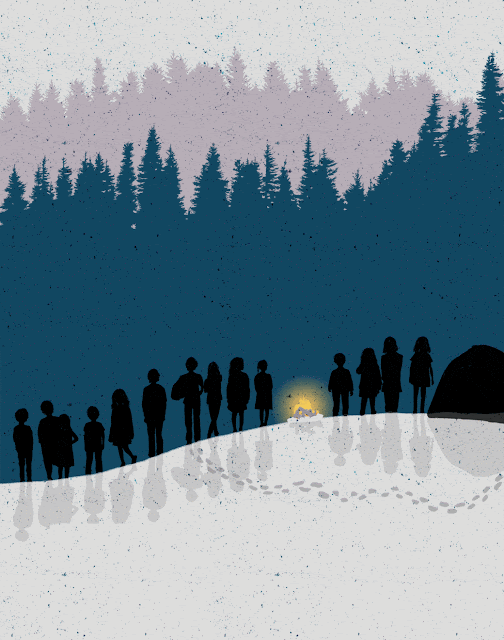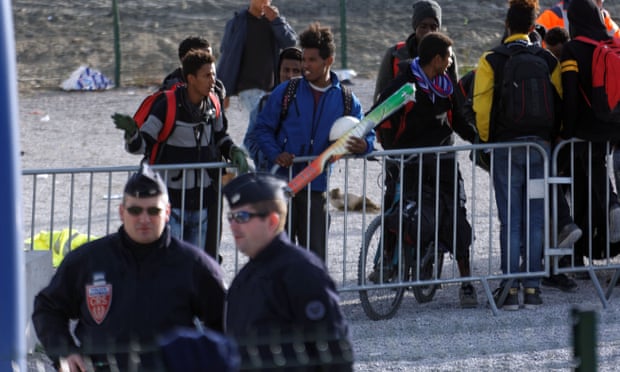La Jungle di Calais, anche dopo gli sgomberi, ha continuato ad
esistere, sotto altre forme, perché esiste ancora il motivo della stessa
esistenza di un campo come quello francese.
Da qualche giorno, come riportato dal The Guardian, diversi
minori rifugiati a Calais, hanno iniziato lo sciopero della fame. A far
scaturire la protesta sono i ritardi nei trasferimenti verso il Regno Unito.
La lunga attesa della decisione dell'Home Office ha spinto un minorenne a
tentare il suicidio.
Calais è un limbo in cui molti minori si trovano a dover
fare i conti con il tritacarne della burocrazia.
Funzionari dell'Agenzia per i Rifugiati delle Nazioni Unite
hanno espresso forti preoccupazioni per la salute di almeno 35 minori non
accompagnati bloccati a Calais.
La maggior parte provengono dall'Afghanistan. Hanno
presentato richieste di ricongiungimento familiare, come da regolamento Dublino
III, ma le decisioni ho ancora non sono arrivate o hanno impiegato in alcuni
casi anche 16 mesi, quando il provvedimento dovrebbe essere adottato entro due
mesi.
Il Guardian ha potuto leggere delle mail dell'UNHCR che
recita:"In particolare, è emerso che lo stato mentale e psicologico dei
bambini si era deteriorato nelle ultime settimane, tra cui il caso di un
bambino che ha tentato il suicidio e 15 minori che stanno attualmente facendo lo sciopero della fame. Siamo stati informati che alcuni dei minori stavano
aspettando da diversi mesi, e probabilmente da un anno, per
la conferma di accettazione e per il trasferimento nel Regno Unito.”
Un'altra email al Ministero degli Interni delle autorità
francesi recita: "Riceviamo notizie molto preoccupanti dall'UNHCR in
merito ad alcuni casi di minori non accompagnati. Temiamo seriamente per la salute mentale
e fisica, nonostante la qualità del supporto che ricevono dalle autorità locali
in Francia.”
"Tutti sono in procinto di ricongiungersi con la
propria famiglia in base alla legge Dublino III, e hanno aspettato per alcuni
mesi o addirittura un anno per alcuni, una risposta alle loro richieste o per un
effettivo trasferimento nel Regno Unito.
"A causa di questi eccessivi ritardi, il loro stato
mentale si è considerevolmente deteriorato: un bambino ha cercato di uccidersi la
settimana scorsa e altri sono in sciopero della fame".
Le e-mail forniscono un'istantanea sulle condizioni disperate incontrate dai ragazzi che arrivano a Calais, avendo
compiuto viaggi insidiosi attraverso l'Europa dal Medio Oriente, dall'Asia
meridionale e dall'Africa.
Come Funziona il Regolamento di Dublino III.
In base al regolamento Dublino III, la Francia invia una
"richiesta di presa in carico" al Regno Unito per indicare che il
minore vuole ricongiungersi con un familiare nel Regno Unito.
Le autorità britanniche hanno due mesi per rispondere. Se la
richiesta viene accettata, avranno quindi sei mesi per effettuare il
trasferimento.
Yvette Cooper, presidente del comitato ristretto per gli
affari interni, ha dichiarato: "Queste rivelazioni sono scioccanti e
inquietanti. Adolescenti e bambini che sono da soli, ma hanno una famiglia qui
in Gran Bretagna che può prendersi cura di loro, non dovrebbero essere bloccati
a causa di una burocrazia lunga e tortuosa.”
"Le autorità britanniche e francesi devono agire
insieme e accelerare queste decisioni e questi processi in modo che i giovani
vulnerabili non debbano deprimersi o essere sfruttati."
"I giovani rifugiati e richiedenti asilo hanno spesso
già subito un enorme trauma, e ora abbiamo dei minori che fanno lo sciopero
della fame e alcuni di loro hanno tentato perfino il suicidio nei campi profughi
in Europa a causa dei lunghi ritardi e dell'incertezza sulle decisioni sul loro
futuro.”
"Più e più volte abbiamo sollecitato la Gran Bretagna e
la Francia ad accelerare il sistema. Nessun minore vulnerabile dovrebbe
rimanere bloccato ad aspettare da solo nei campi fino a un anno, quando
potrebbero stare con la famiglia, in una casa sicura o a scuola ".
"Al momento di decidere se consentire ai minori di
unirsi alla famiglia nel Regno Unito, il governo sta regolarmente superando i
limiti di tempo consentiti dalla legge europea", ha detto Eleanor
Harrison, rappresentante di Safe Passage, un'organizzazione che fornisce
supporto legale ai migranti.
"Purtroppo, i ritardi evidenziati in questo caso non
sono eccezionali. Molti minori che potrebbero ricostruire la loro infanzia con
la loro famiglia sono invece spesso bloccati nel limbo per un anno o più."
"Ovviamente è necessario assicurarsi che il
ricongiungimento familiare sia nel miglior interesse del bambino, ma
chiaramente i loro interessi non vengono raggiunti se ritengono di non avere
altra scelta che continuare lo sciopero della fame o tentare il suicidio.”
"Una ricerca di Safe Passage ha rilevato che alcuni
bambini hanno avuto un’attesa di 16 mesi per il ricongiungimento familiare in
Europa - questi ritardi eccessivi aumentano il rischio di fuga, cercare metodi
pericolosi per attraversare le frontiere, come saltare sul retro di un camion o
affidarsi ai contrabbandieri.”
"Invitiamo il governo a rispettare i suoi obblighi
internazionali e assicurare che i bambini siano trasferiti nel Regno Unito in
modo sicuro e il più rapidamente possibile".
Le cifre ufficiali mostrano che soltanto 450 minori non
accompagnati richiedenti asilo sono arrivati nel Regno Unito dall'inizio del
2015 in base al regolamento Dublino III.
Leonardo Cavaliere
Foto: BRUNO FERT
E-BOOK GRATIS
SCARICA GRATUITAMENTE LA GUIDA PRATICA
I Minori Stranieri non Accompagnati
C’era una volta la Jungle di Calais?
La Jungle di Calais, anche dopo gli sgomberi, ha continuato ad esistere, sotto altre forme, perché esiste ancora il motivo della stessa e...




















